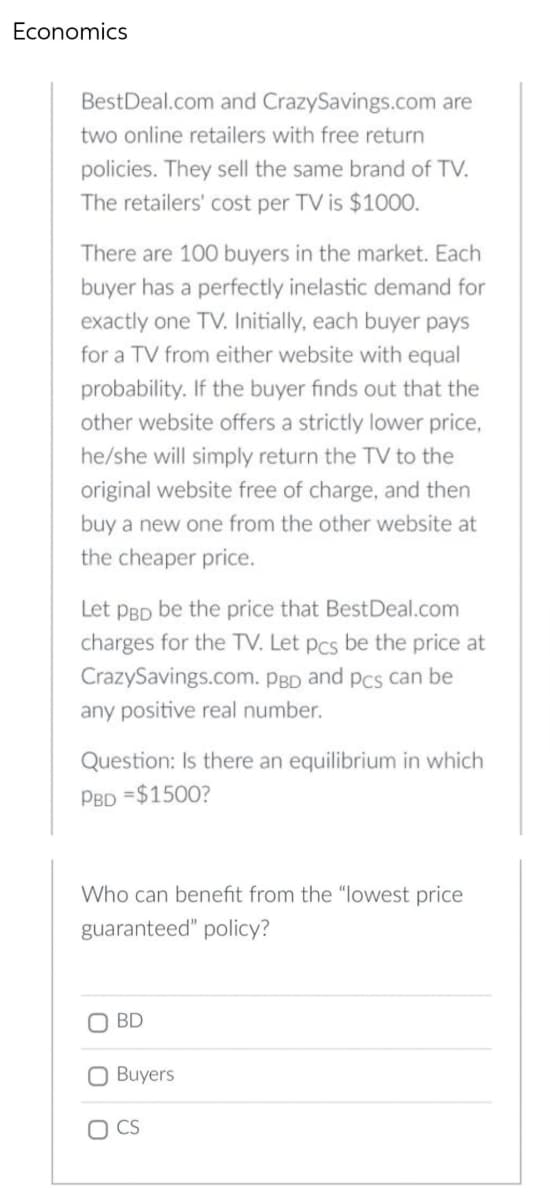BestDeal.com and CrazySavings.com are two online retailers with free return policies. They sell the same brand of TV. The retailers' cost per TV is $1000. There are 100 buyers in the market. Each buyer has a perfectly inelastic demand for exactly one TV. Initially, each buyer pays for a TV from either website with equal probability. If the buyer finds out that the other website offers a strictly lower price, he/she will simply return the TV to the original website free of charge, and then buy a new one from the other website at the cheaper price. Let PBD be the price that BestDeal.com charges for the TV. Let pcs be the price at
BestDeal.com and CrazySavings.com are two online retailers with free return policies. They sell the same brand of TV. The retailers' cost per TV is $1000. There are 100 buyers in the market. Each buyer has a perfectly inelastic demand for exactly one TV. Initially, each buyer pays for a TV from either website with equal probability. If the buyer finds out that the other website offers a strictly lower price, he/she will simply return the TV to the original website free of charge, and then buy a new one from the other website at the cheaper price. Let PBD be the price that BestDeal.com charges for the TV. Let pcs be the price at
Managerial Economics: A Problem Solving Approach
5th Edition
ISBN:9781337106665
Author:Luke M. Froeb, Brian T. McCann, Michael R. Ward, Mike Shor
Publisher:Luke M. Froeb, Brian T. McCann, Michael R. Ward, Mike Shor
Chapter16: Bargaining
Section: Chapter Questions
Problem 16.1IP
Related questions
Question
2

Transcribed Image Text:Economics
BestDeal.com and CrazySavings.com are
two online retailers with free return
policies. They sell the same brand of TV.
The retailers' cost per TV is $1000.
There are 100 buyers in the market. Each
buyer has a perfectly inelastic demand for
exactly one TV. Initially, each buyer pays
for a TV from either website with equal
probability. If the buyer finds out that the
other website offers a strictly lower price,
he/she will simply return the TV to the
original website free of charge, and then
buy a new one from the other website at
the cheaper price.
Let PBD be the price that BestDeal.com
charges for the TV. Let pcs be the price at
CrazySavings.com. PBD and pcs can be
any positive real number.
Question: Is there an equilibrium in which
PBD =$1500?
Who can benefit from the "lowest price
guaranteed" policy?
BD
O Buyers
CS
Expert Solution
This question has been solved!
Explore an expertly crafted, step-by-step solution for a thorough understanding of key concepts.
Step by step
Solved in 2 steps

Knowledge Booster
Learn more about
Need a deep-dive on the concept behind this application? Look no further. Learn more about this topic, economics and related others by exploring similar questions and additional content below.Recommended textbooks for you

Managerial Economics: A Problem Solving Approach
Economics
ISBN:
9781337106665
Author:
Luke M. Froeb, Brian T. McCann, Michael R. Ward, Mike Shor
Publisher:
Cengage Learning


Managerial Economics: A Problem Solving Approach
Economics
ISBN:
9781337106665
Author:
Luke M. Froeb, Brian T. McCann, Michael R. Ward, Mike Shor
Publisher:
Cengage Learning
